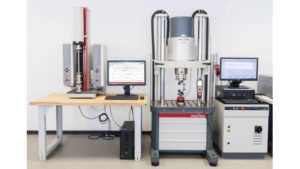Autoinjector Testing with Zwick

An autoinjector is a medical device used to administer liquid medication that is subject to strict quality controls.
Years ago, autoinjectors were mainly used by untrained people to administer drugs as quickly as possible. Examples of this are adrenalin injectors used in cases of anaphylactic shock and morphine or atropine injectors used by soldiers in combat missions. Today, there are other factors that contribute to the increased use of autoinjectors.
One is the issue of injection instead of ingestion, which means certain substances (for example, biopharmaceuticals) cannot be administered in tablet form, because they would be digested in the patient’s gastrointestinal tract and would not enter the bloodstream. The other is that the autoinjector functions as the doctor’s extended arm. Injectors guarantee a high level of application safety.
The correct injection and proper dose of medicines are vital to achieve the best therapeutic success. That is why pharmaceutical manufacturers strive to achieve a high level of automation in autoinjector technology.
The patient simply removes the safety cap, positions the injector, and injects the drug by pressing a button. The process that follows is completely automated. However, this also means that all of the injector’s relevant functions must be checked before the production batch is released on the market. This test is performed to DIN EN ISO 11608-5.
Autoinjector testing with Zwick
Zwick offers testing systems that can perform the following automated tests:
- Removal force of the safety cap
- Activation force and displacement of the autoinjector
- Injector timing
- Determination of the administered drug volume, including the last drops with an integrated high-resolution scale
- Effective needle length for injection



